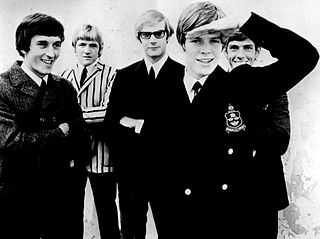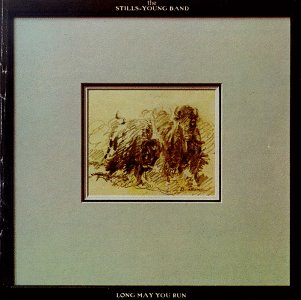Acrimony may refer to:
- a feeling of hatred
- Acrimony (band), a rock band
- Acrimony (film), a 2018 film
Acrimony may refer to:
Cinema may refer to:
Producer or producers may refer to:
James is a common English language surname and given name:

Herman's Hermits are an English beat, rock and pop group formed in 1964 in Manchester, originally called Herman and His Hermits and featuring lead singer Peter Noone. Produced by Mickie Most, the Hermits charted with number ones in the UK and in America, where they ranked as one of the most successful acts in the Beatles-led British Invasion. They also appeared in four films, two of them vehicles for the band.
Bleach is a chemical that removes color or whitens.

The Dorsey Brothers were an American studio dance band, led by Tommy and Jimmy Dorsey. They started recording in 1928 for OKeh Records.

Henry Cluney is a guitarist and former member of the band Stiff Little Fingers. He remained with the group until lead singer Jake Burns disbanded them in 1983.
Special or specials may refer to:

Long May You Run is a studio album credited to the Stills–Young Band, a collaboration between Stephen Stills and Neil Young, released in 1976 on Reprise Records. It peaked at #26 on the Billboard 200 and was certified gold in the United States by the RIAA. The album is the sole studio release by Stills and Young in tandem.
Android may refer to:
Acrimony was a Welsh heavy metal band from Swansea who was active during the 1990s. Releasing their debut album in 1994, they are regarded as the pioneers of stoner metal in the United Kingdom, and an important influence upon the scene. Although the band never achieved mainstream success, during their career they received much critical acclaim – they were nominated for the Kerrang! Best Newcomer award and earned top review ratings. Acrimony have maintained a cult following in the British metal scene, their records reportedly selling for vast sums as collectors items. AllMusic described their musical style as a "powerful blend of Black Sabbath’s heavy metal riffery, Hawkwind's space rock excursions, and Blue Cheer's fuzzed-out psychedelic feedback." In 2019, Kerrang! listed Acrimony as part of "20 bands who didn't get the respect they deserved".

Leaf Hound Records is a Japanese record label specializing in 1960s and 1970s inspired stoner/doom metal. The label takes its name from the 1970s hard rock band Leaf Hound. Leaf Hound Records has released material from Japanese bands such as Church of Misery and Sonic Flower, US bands such as Blood Farmers and Acid King and European bands such as Orange Sunshine and Acrimony. They have re-released a number of albums that were originally released by Germany's Hellhound Records. These reissues include Revelation's Never Comes Silence, Iron Man's Black Night and The Passage, and the Blood Farmers self-titled album. They have also reissued two other Revelation albums, Salvation's Answer and an unreleased album, and have also announced plans to issue Revelation's fourth album, Release.
"I Wish I Knew How It Would Feel to Be Free" is a jazz song written by Billy Taylor. Taylor's original version was recorded on November 12, 1963, and released on his Right Here, Right Now! album the following year. His 1967 live version, from the album of the same name, was later used as the theme music for the Film... review programme series on BBC Television.

Tumuli Shroomaroom is the second full-length studio album from Welsh stoner rock/doom band Acrimony. It was released in 1997 on Peaceville Records.
High Dependency Unit are a New Zealand psychedelic rock band originating from Dunedin. Forming in 1994, the band was described by BBC DJ and presenter John Peel as "one of the 10 best bands in the world you've never heard of." The band consists of Tristan Dingemans, Neil Phillips and Constantine Karlis.
The Troggs Tapes is a bootleg recording of the English rock band the Troggs. It was originally recorded in 1970, and consists of band members arguing over the recording of a song, with frequent profanity. It has become one of the best-known spoken-word bootleg recordings, and influenced work such as the film This is Spinal Tap.

Bresha Webb is an American actress. She starred as Imunique Jefferson in the TV One comedy series Love That Girl! from 2010 to 2014. She later has appeared in films Meet the Blacks (2016), Acrimony (2018), Night School (2018), Sextuplets (2019) and A Fall from Grace (2020).

Acrimony is a 2018 American psychological thriller film written, produced and directed by Tyler Perry. The film stars Taraji P. Henson, Lyriq Bent and Crystle Stewart. It follows a loyal wife who decides to take revenge on her ex-husband who has wronged her in life. Principal photography began in October 2016 in Pittsburgh. Acrimony was released in the United States by Lionsgate on March 30, 2018. It received generally negative reviews and grossed $46 million worldwide.

Hymns to the Stone is the first full-length studio album from Welsh stoner rock/doom band Acrimony. It was released in 1994 on Godhead Recordings. In November 2019, Hymns to the Stone was reissued as part of a 3-CD digipack and remastered edition by the Dutch music label Burning World Records.

The Beatles: Get Back is a 2021 documentary series directed and produced by Peter Jackson. It covers the making of the Beatles' 1970 album Let It Be and draws largely from unused footage and audio material originally captured for the identically titled 1970 documentary of the album by Michael Lindsay-Hogg. The docuseries has a total runtime of nearly eight hours, consisting of three episodes between two and three hours, each covering roughly weekly periods of 21 days of studio time.